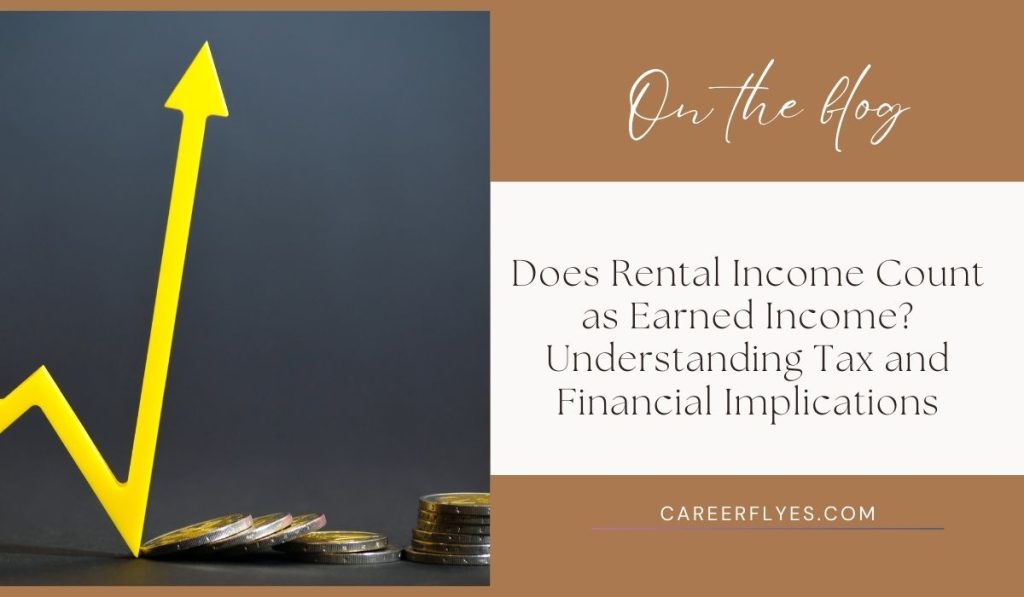
If you own a rental property, you may wonder whether the income you receive from it is classified as earned income or unearned income.
This distinction matters because it affects taxes, retirement contributions, and even Social Security benefits.
In this guide, we’ll explore what makes income “earned” or “unearned,” why rental income is typically classified as passive income, and how this impacts your financial planning.
Understanding Earned Income vs. Unearned Income

To clarify why rental income is generally not considered earned income, it helps to understand these classifications:
- Earned Income: This includes wages, salaries, tips, and self-employment income—essentially, any income earned from active work.
- Unearned Income: This includes income from investments, such as dividends, interest, and rental income.
The IRS differentiates between these types because they have different tax implications. Earned income is typically subject to FICA taxes (Social Security and Medicare), while unearned income is often taxed differently and may come with certain tax benefits.
What Counts as Rental Income?
Rental income includes any payments you receive from tenants for using your property. It may come from residential, commercial, or vacation rentals, and can also include additional charges like late fees or reimbursements for utilities. Under IRS guidelines, rental income is considered passive income unless you materially participate in a real estate business.
Why Rental Income Is Usually Not Considered Earned Income
Rental income is generally classified as passive income by the IRS. Here’s why:
- Passive Income Classification: Rental income is earned from property ownership, not active work. Without daily involvement in the operations, it is classified as passive.
- No Social Security or Medicare Contribution: Unlike earned income, rental income is not subject to Social Security or Medicare taxes. This means that while you benefit from rental income, it doesn’t contribute toward Social Security or Medicare credits.
For most property owners, this passive classification is beneficial, as it results in lower taxes on rental earnings.
Tax Implications of Rental Income Being Unearned
Since rental income is classified as passive or unearned, it’s taxed differently than wages or self-employment income.
- No FICA Taxes: Rental income isn’t subject to FICA taxes (Social Security and Medicare), which applies to earned income.
- Deductions for Expenses: You can offset rental income with deductible expenses like property maintenance, repairs, insurance, and mortgage interest.
- Depreciation Benefits: The IRS allows property owners to depreciate the property over time, which reduces taxable rental income.
These tax benefits help property owners maximize their rental income without the additional tax burden on earned income.
Impact on Social Security and Medicare Contributions

Since rental income is not earned income, it does not contribute toward Social Security or Medicare. This can impact future benefits, especially if rental income is your primary source of earnings. Only wages, salaries, and self-employment income qualify for these contributions, so individuals relying primarily on rental income may need to consider other retirement savings options.
Rental Income and Retirement Contributions
To contribute to retirement accounts like an IRA or 401(k), you need earned income. Because rental income doesn’t qualify, you can’t use it to make retirement contributions.
- IRAs and Earned Income Requirement: Contributions to Traditional IRAs, Roth IRAs, and other retirement accounts require earned income, which means rental income alone won’t qualify.
- Alternative Savings Options: Property owners who rely on rental income might consider other savings and investment strategies to secure their retirement.
If you’re managing rental properties but aren’t eligible for retirement contributions based on earned income, consult a financial advisor to explore savings alternatives.
Scenarios Where Rental Income Might Be Treated as Earned Income
In specific cases, rental income could potentially qualify as earned income, especially for individuals who materially participate in their rental activities.
- Material Participation: If you actively manage and operate your rental property, you may qualify as a real estate professional under IRS guidelines. This could allow your rental income to be treated as earned income.
- Real Estate Professional Status: To qualify, you must meet certain requirements, such as spending at least 750 hours annually in real estate activities. This classification may impact how your rental income is taxed.
Check with a tax professional if you believe you may qualify, as IRS rules are strict about who can classify rental income as earned.
Q: Does rental income affect earned income credits?
A: No, rental income is classified as passive, so it does not count toward earned income credits like the Earned Income Tax Credit (EITC).
Q: Can rental income be used for retirement contributions?
A: No, only earned income can be used to contribute to retirement accounts like IRAs and 401(k)s. Rental income alone does not qualify.
Q: Is rental income taxed differently than wages?
A: Yes, rental income is passive and subject to different tax rules. It isn’t subject to Social Security or Medicare taxes, but it may qualify for certain deductions and depreciation benefits.
Conclusion
In most cases, rental income is not considered earned income. This classification has important tax and financial implications, particularly in terms of Social Security, Medicare, and retirement contributions. While rental income provides valuable cash flow, it’s categorized as passive income unless you meet specific criteria for material participation. For those who rely heavily on rental income, it’s essential to explore additional retirement savings options and consult with a tax professional to make the most of available benefits.
Do you have more questions about rental income and taxes? Comment below or subscribe for more financial insights!



